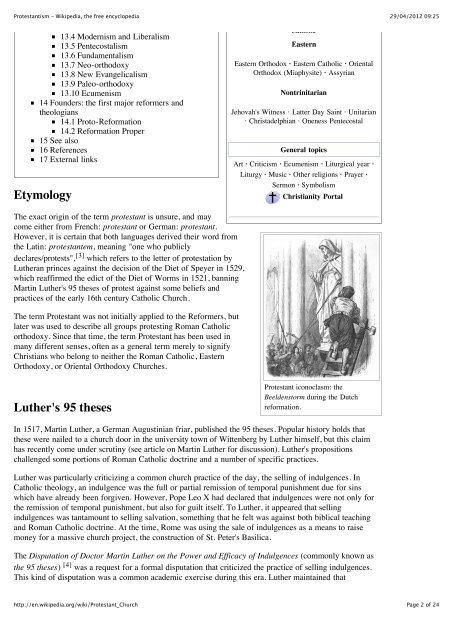Protestantism - Wikipedia, the free encyclopedia
Protestantism - Wikipedia, the free encyclopedia
Protestantism - Wikipedia, the free encyclopedia
You also want an ePaper? Increase the reach of your titles
YUMPU automatically turns print PDFs into web optimized ePapers that Google loves.
<strong>Protestantism</strong> - <strong>Wikipedia</strong>, <strong>the</strong> <strong>free</strong> <strong>encyclopedia</strong><br />
13.4 Modernism and Liberalism<br />
13.5 Pentecostalism<br />
13.6 Fundamentalism<br />
13.7 Neo-orthodoxy<br />
13.8 New Evangelicalism<br />
13.9 Paleo-orthodoxy<br />
13.10 Ecumenism<br />
14 Founders: <strong>the</strong> first major reformers and<br />
<strong>the</strong>ologians<br />
14.1 Proto-Reformation<br />
14.2 Reformation Proper<br />
15 See also<br />
16 References<br />
17 External links<br />
Etymology<br />
The exact origin of <strong>the</strong> term protestant is unsure, and may<br />
come ei<strong>the</strong>r from French: protestant or German: protestant.<br />
However, it is certain that both languages derived <strong>the</strong>ir word from<br />
<strong>the</strong> Latin: protestantem, meaning "one who publicly<br />
declares/protests", [3] which refers to <strong>the</strong> letter of protestation by<br />
Lu<strong>the</strong>ran princes against <strong>the</strong> decision of <strong>the</strong> Diet of Speyer in 1529,<br />
which reaffirmed <strong>the</strong> edict of <strong>the</strong> Diet of Worms in 1521, banning<br />
Martin Lu<strong>the</strong>r's 95 <strong>the</strong>ses of protest against some beliefs and<br />
practices of <strong>the</strong> early 16th century Catholic Church.<br />
The term Protestant was not initially applied to <strong>the</strong> Reformers, but<br />
later was used to describe all groups protesting Roman Catholic<br />
orthodoxy. Since that time, <strong>the</strong> term Protestant has been used in<br />
many different senses, often as a general term merely to signify<br />
Christians who belong to nei<strong>the</strong>r <strong>the</strong> Roman Catholic, Eastern<br />
Orthodoxy, or Oriental Orthodoxy Churches.<br />
Lu<strong>the</strong>r's 95 <strong>the</strong>ses<br />
http://en.wikipedia.org/wiki/Protestant_Church<br />
Catholic<br />
Eastern<br />
Eastern Orthodox · Eastern Catholic · Oriental<br />
Orthodox (Miaphysite) · Assyrian<br />
Nontrinitarian<br />
Jehovah's Witness · Latter Day Saint · Unitarian<br />
· Christadelphian · Oneness Pentecostal<br />
General topics<br />
Art · Criticism · Ecumenism · Liturgical year ·<br />
Liturgy · Music · O<strong>the</strong>r religions · Prayer ·<br />
Sermon · Symbolism<br />
Christianity Portal<br />
Protestant iconoclasm: <strong>the</strong><br />
Beeldenstorm during <strong>the</strong> Dutch<br />
reformation.<br />
In 1517, Martin Lu<strong>the</strong>r, a German Augustinian friar, published <strong>the</strong> 95 <strong>the</strong>ses. Popular history holds that<br />
<strong>the</strong>se were nailed to a church door in <strong>the</strong> university town of Wittenberg by Lu<strong>the</strong>r himself, but this claim<br />
has recently come under scrutiny (see article on Martin Lu<strong>the</strong>r for discussion). Lu<strong>the</strong>r's propositions<br />
challenged some portions of Roman Catholic doctrine and a number of specific practices.<br />
Lu<strong>the</strong>r was particularly criticizing a common church practice of <strong>the</strong> day, <strong>the</strong> selling of indulgences. In<br />
Catholic <strong>the</strong>ology, an indulgence was <strong>the</strong> full or partial remission of temporal punishment due for sins<br />
which have already been forgiven. However, Pope Leo X had declared that indulgences were not only for<br />
<strong>the</strong> remission of temporal punishment, but also for guilt itself. To Lu<strong>the</strong>r, it appeared that selling<br />
indulgences was tantamount to selling salvation, something that he felt was against both biblical teaching<br />
and Roman Catholic doctrine. At <strong>the</strong> time, Rome was using <strong>the</strong> sale of indulgences as a means to raise<br />
money for a massive church project, <strong>the</strong> construction of St. Peter's Basilica.<br />
The Disputation of Doctor Martin Lu<strong>the</strong>r on <strong>the</strong> Power and Efficacy of Indulgences (commonly known as<br />
<strong>the</strong> 95 <strong>the</strong>ses) [4] was a request for a formal disputation that criticized <strong>the</strong> practice of selling indulgences.<br />
This kind of disputation was a common academic exercise during this era. Lu<strong>the</strong>r maintained that<br />
29/04/2012 09:25<br />
Page 2 of 24


